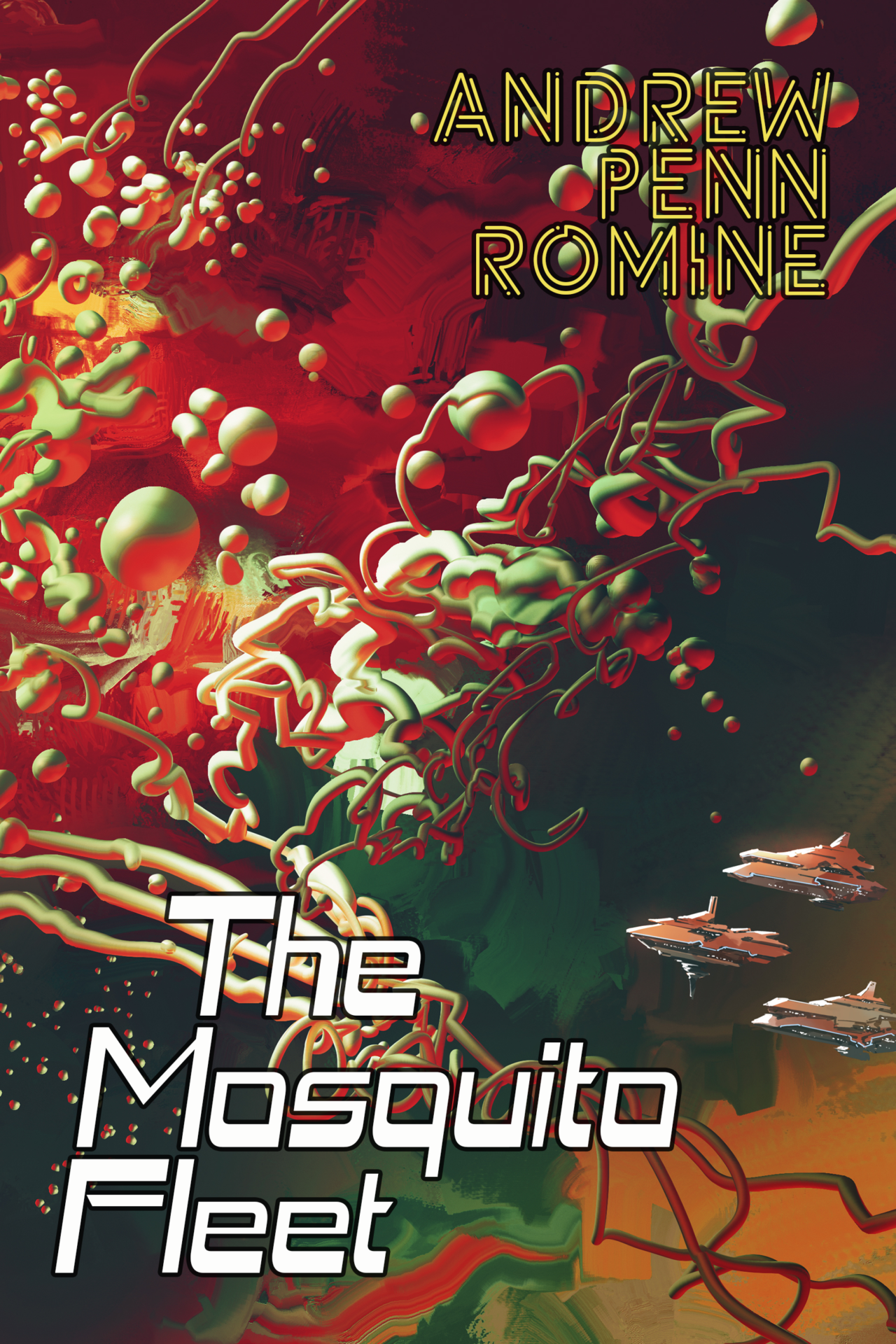
Andrew Penn Romine is joining us today to talk about his novel, The Mosquito Fleet. Here’s the publisher’s description:
New sci-fi horror novel, The Mosquito Fleet, by Andrew Penn Romine, explores the strange lives of starship crews at the fringes of known space. Shipping in October.
In the far future, humankind has settled remote frontier worlds thanks to the science of biotics, a combination of organic and inorganic engineering that powers FTL drives and even synthetic humans.
What’s Andrew’s favorite bit?

The Mosquito Fleet is, among other things, my love letter to the films of the Alien franchise. Corporate interests rule human lives in those movies, and the horrors of company greed are at least as sinister as the Xenomorphs trying to devour our heroes.
The on-screen representatives of such corporate machinations are the androids, synthetic lifeforms lacking empathy and totally devoted to company policy. Their secret directives and inhuman abilities are designed to enforce the company’s bottom line. They’re the villains of the story as much as the cosmic horror space monsters are. In Alien, Ash openly envies the xenomorph:
I admire its purity. A survivor… unclouded by conscience, remorse, or delusions of morality.
One of my aims in writing The Mosquito Fleet was flipping that script. My synthetics would be vulnerable not only to cosmic horrors but also to corporate machinations. They would be the heroes of the story.
Lira, the main character of The Mosquito Fleet, is no master manipulator like David or a cold, calculating company operative like Ash or Rook. She’s got very human problems, in fact: PTSD in the wake of a disaster she may have caused, a med-stim addiction trying to ease the guilt, and a fraying romantic relationship with her human partner.
Her engineered ability to communicate with the primitive organo-mechanical brains of jump-capable ships granted her a second chance to eke out a living on a dilapidated ferry vessel, but her relationship with her new crew is complicated, too.
The sense that Lira’s losing control of herself is only heightened by the emergence of the Rot – a contagion that spreads from the biotic heart of one living ship to another, causing them to veer off course towards destinations unknown. Lira’s own biotic nature makes her susceptible to body horror in the way her movie counterparts are not.
Her synthetic biology may have been developed from the same tech as Grass is Greener, but she’s several orders of magnitude more complex: a human to a nematode. If the biotic cores of ships are susceptible to those impulses, what did that say about the brains of the synthetics who interfaced with them?
Later in the book we meet military-grade synthetic Mai. Unlike Lira, she does carry secret directives from her superiors and is endowed with superhuman strength and speed to carry out those directives. She rejects her programming to try and save her crew in a deadly fight with manifestations of The Rot.
In the final act of The Mosquito Fleet, we’re also introduced to Cam, another synthetic space jockey eking out a living on a Company contract aboard a tow-barge. Cam is a new generation of synthetic, less capable of talking to jumpships but also protected from the ravages of The Rot. When her ship encounters a lifepod where none should be, Cam’s human captain is skeptical and would rather just complete their contract with no complications. It’s Cam who insists they’re obligated to rescue the castaway, no matter how that might affect the Company’s bottom line.
Irritation prickles Cam’s cheeks. Is the skipper suggesting they ignore the pod? “We’re required by Colonial Protocol and contract to render aid,” she insists. “You’d let someone die out there to make our schedule?”
Without diving too much into spoiler territory, Lira and Cam (and Mai) are presented with several choices that could allow them to transcend their human counterparts and become truly superior beings in the galaxy the Rot seems to be remaking.
So [Lira] presses deeper in, following Blinn’s song into the light. The melodies of his awakening are unlike the shrill chords … of Grass is Greener; these are uplifting, as far from the discordant notes of [that] infestation as she can imagine. For all that though, Blinn’s song is no less destructive, for she senses uncharted paths within it. Utter dissolution in the quantum shear.
How the synthetics struggle with temptation and how they choose to embrace their humanity despite it, is definitely one of My Favorite Bits of The Mosquito Fleet. I hope it might be yours, too. Thanks for reading!
LINKS:
BIO:
Andrew Penn Romine teaches animation and VFX, following a career working in Hollywood on award-winning films and television.
His stories have appeared in Lightspeed, FUNGI, HELP FUND MY ROBOT ARMY, and By Faerie Light. He lives in the Pacific Northwest and enjoys mixing cocktails and watching terrible movies. You can find him all over the internet.
